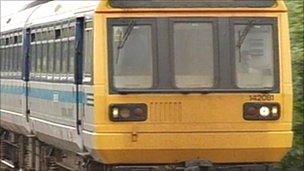Long-term safety fears over Yorkshire's Pacer trains
- Published

A report by the rail regulator says there is concern over the long-term safety of Pacer trains
Pacer trains are some of the most unpopular on the network.
Built in the 1980s, they are essentially a bus body mounted on a freight wagon chassis with a diesel engine slung underneath.
When passengers complain of cattle truck conditions, they are sometimes closer to the truth than they realise.
Pacer trains were built as a stop-gap with an expected life of no more than 20 years. But they are now 25 years old and there are no plans to replace them.
'Notable incidents'
Now the rail regulator is placing a question mark over the long-term safety of Pacers, saying: "There is particular concern over the ongoing use of Pacers beyond their intended design life."
It says there have been some "notable incidents", including the failure of drive shafts that transmit power from the engine to the wheels.
Northern Rail operates about 100 Pacer trains all over the north of England.
In Yorkshire, it operates commuter services around Leeds, Sheffield, Huddersfield, Wakefield and York over routes such as the Huddersfield-Sheffield and Huddersfield-Wakefield lines, between York, Harrogate and Leeds, and on the coast line from Scarborough to Hull.
There is no suggestion that the trains are unsafe today.
But the rail regulator says its investigations are continuing and it wants to see an action plan from the rail industry that demonstrates how the trains will be kept safe as they get older.
They already have an extensive daily safety check, and Northern Rail insists they would not be allowed out on the tracks if there were any doubts about their safety.
Higher fares
But the company does accept that the trains are old and need replacing. The problem is how to afford it.
A new train would cost about six times as much as a Pacer in leasing charges, so each train would have to carry six times the number of passengers or the subsidy paid to keep loss-making lines running would have to go up by the same factor.
Neither action is likely. Instead, it looks as though if commuters want new trains they will have to be prepared to pay for them through higher fares.
That would be politically unpopular as well as bringing howls of outrage from daily travellers. But it is a fact that rail fares in Yorkshire are low compared with other parts of the country.
Northern says its average fare is just £2.19, less than the cappuccino that many commuters buy to drink on the train.
Car parking is also free at most local stations, and that is likely to come under scrutiny. Commuters in the South East are accustomed to paying to park at their local station.
Yorkshire commuters are not, and that may have to change if they are ever to afford the cost of the shiny new trains which rail travellers would love to see.
- Published13 April 2011
- Published22 March 2011